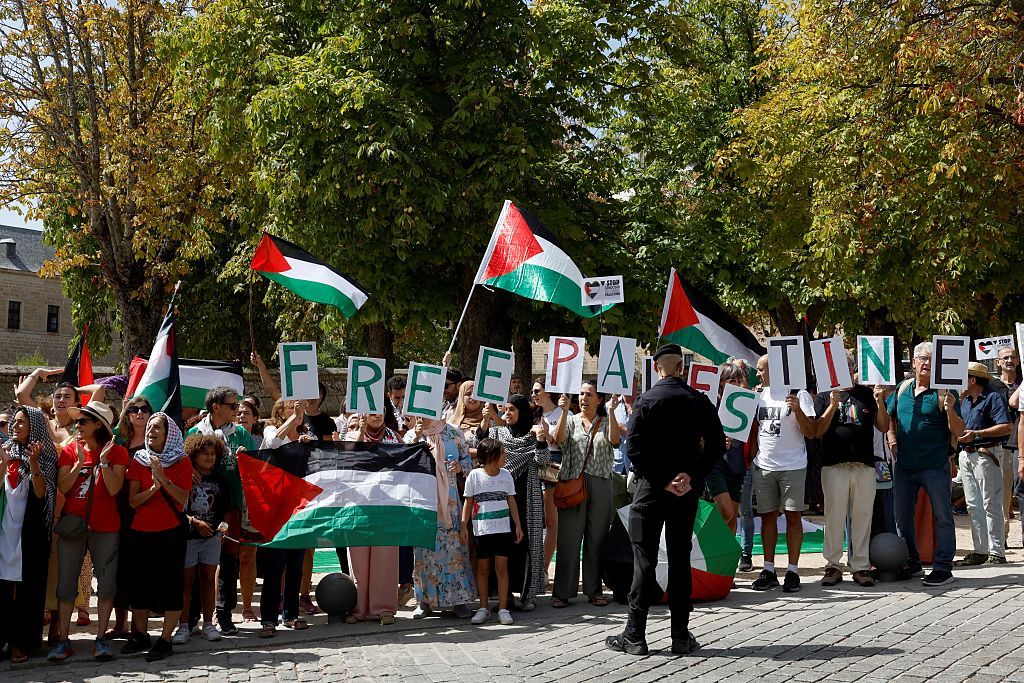
In the closing kilometres of stage 13 of this year's Vuelta a España, a dog tied to a chair ran out into the road. Thankfully, the incident didn't cause any problems, and neither any riders nor the animal got hurt. But in the most volatile edition of the Vuelta in decades, where for two weeks the possibility that the entire event could grind to a halt has been constantly on the table, the misfortune of one hapless canine briefly sparked rose-tinted memories.
Suddenly, it seemed, we were cast back to previous editions, where protests were so rare it felt like the only regular off-road incidents affecting the Vuelta were stray animals and the odd confused, over-enthusiastic or inebriated spectator ending up colliding in one form or another with the race.
The reality is completely otherwise, in that the Vuelta as well as many other races have always been affected by external protests like the pro-Palestine demonstrations of this year's Spanish Grand Tour. Some of them political, others social, others simply relating to diehard fans and excessive loyalties. Go all the way back to the 1904 edition of the Tour de France, in fact, and you'll see it was famous for its road blockades, attacks on riders and nails strewn in the road by rival supporters groups, not to mention the first four riders cheating.
In the 90-year history of the Vuelta, the most notorious off-road suspension came in 1978, when Basque separatists violently disrupted the race. "I remember how they rolled tree trunks down a slope to block the road in front of us," Enrique Cima, a former Spanish pro present that day, told Cyclingnews, "and they had to neutralize the stage til the last 15 kilometres into San Sebastián."
Matters could hardly have got worse, it seemed, but they did. In the afternoon's time trial, after Bernard Hinault turned in a race-winning time, other riders like Jean-René Bernaudeau, running third, were unable to finish because of the protesters. The stage was cancelled, Hinault proclaimed the overall winner, and the Vuelta did not return to the Basque Country until 2011.
The very occasional blockading of the roads, or attempts to harm participants, or both, have continued to happen as the years rolled by. To focus on the Vuelta alone, in the Canary Islands in the late 1980s, pro-independence supporters briefly wreaked havoc by throwing drawing pins onto the roads. In one stage through Navarre – seen as part of the Basque Country by some separatists – in the mid 1990s, the semi-military Guardia Civil police forcibly removed protesters from the road. More recently, in 2023, police arrested four separatists who wanted to hose oil from a barrel off a bridge onto the course in protest when the Vuelta a España passed through Catalunya.
The scale of this year's protests
The difference between previous years and this one, then, isn't in the kind of disruption happening. It's in the degree in which it has happened.
In the 2025 Vuelta, the pro-Palestine protests, largely directed against the presence of the Israel-Premier Tech team, have been a constant both on the roadside and with repeated incursions from stage 5 onwards. It's reached the point where Spanish newspaper Público claimed the protests are the biggest sporting boycott in Europe to date regarding the ongoing conflict in Gaza and an Israeli team. And the race hasn't finished yet.
Strikingly, though, the protests only began in earnest once the Vuelta returned from Italy, with the first blockade coming when half a dozen demonstrators attempted to stop Israel-Premier Tech from racing the team time trial in Figueres on stage 5. That begs the question, again, as to why the protests have been so sustained and disruptive in Spain when in other countries – like when a pro-Palestine demonstrator broke onto the finishing straight of stage 15 of the Tour de France, for example – it was much more of an isolated incident.
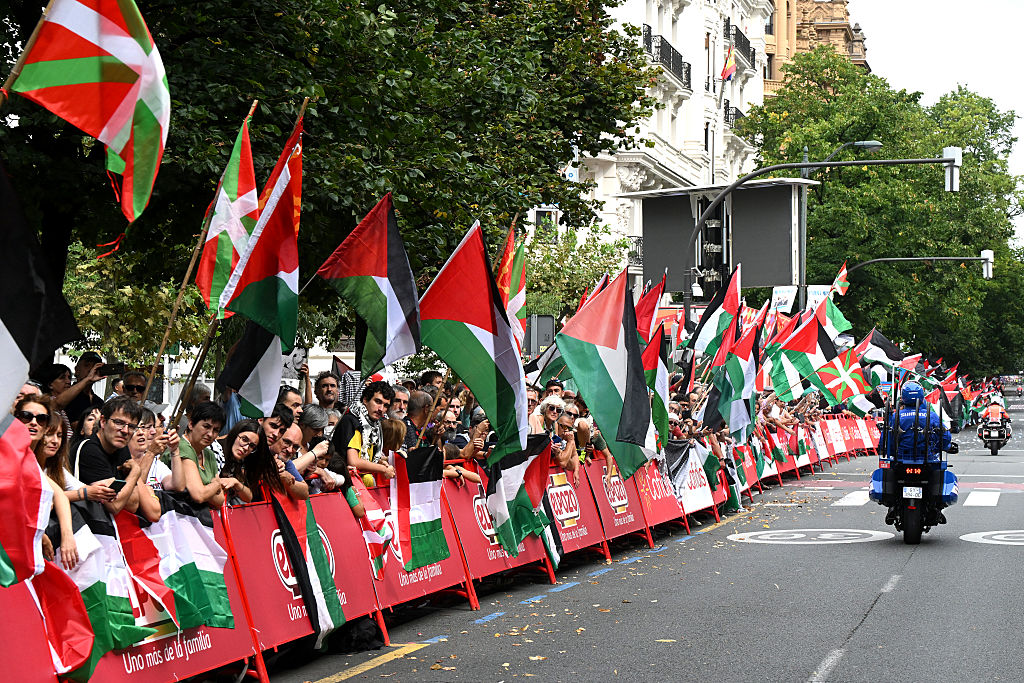
In the Vuelta, on the other hand, barely a day has gone past since stage 5 without the protests multiplying and having some kind of knock-on effect. At its most extreme, stage 11 into Bilbao in the Basque Country saw the race suspended three kilometres from the finale, stage 16 in Galicia saw the race ended with eight kilometres to go, and stage 18's time trial in Valladolid was more than halved in length due to security fears.
Stage 20 came within a whisker of stopping after protestors staged a sitdown protest 17 kilometres from the finish, and only a handily placed access road to a roundabout meant the main group could get through without delays. It remains to be seen how or if stage 21 through Madrid, already cut by five kilometres because of traffic restrictions, is finally affected.
Stages 11 and 16 were far from being the only attempts to blockade the race, with protesters trying to stop the race on – at least – stages 6, 10, 13, 18 and 20 as well as felling a tree trunk across the road on stage 16. Equally, risks to rider safety were highlighted when Simone Petilli (Intermarché-Wanty) and Javier Romo (Movistar) were separately caught up in crashes caused either directly – in Petilli's case – or indirectly by protesters attempting to stop the race. Other occurrences, like the by-now regular hacking of Vuelta a España race radio at 3.45pm every day to broadcast snatches of pro-Palestine songs, feel much more trivial in comparison, but they still indicate how sustained the protests have been.
The protests and arrests have extended to outside the race, sometimes seriously, with Israel-Premier Tech the central target of demonstrations. Team hotels have seen protests, tomatoes and paint have been thrown at the IPT team bus and one team director, Oscar Guerrero, reportedly left the race after anti-Israel graffiti was plastered on his house in Navarra. The team have removed the word Israel from their jerseys – already absent from their vehicles for some time – but the protests have continued.
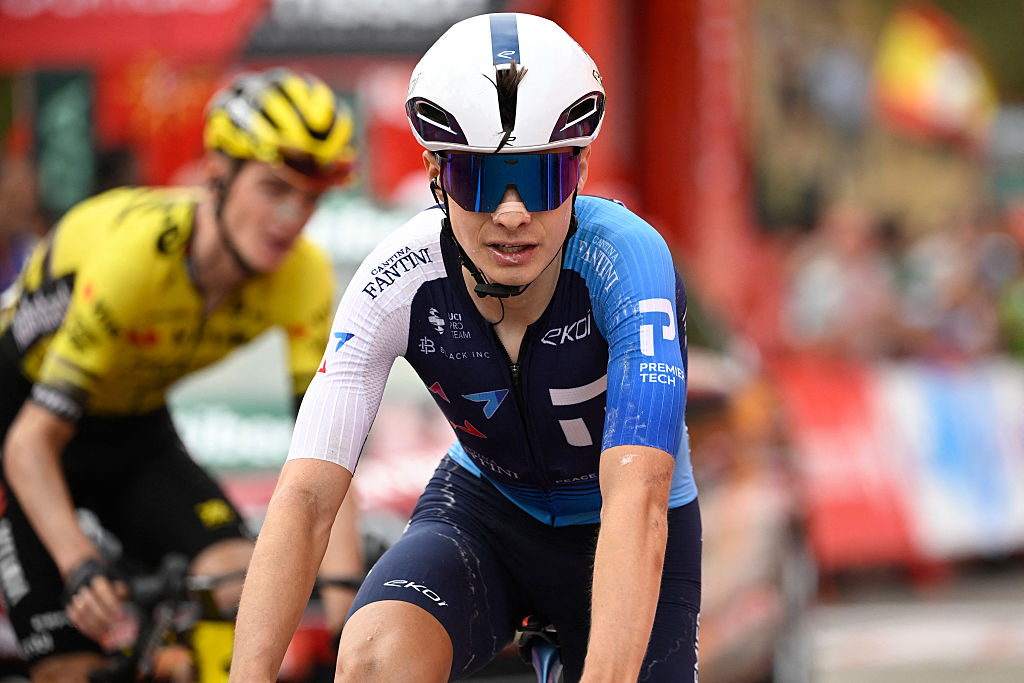
It has to be underlined that a significant majority of demonstrations have been peaceful and numerous, mainly characterised by large crowds with flags, present in almost every start and finish and through many of the towns and cities through which the Vuelta has passed.
The more aggressive, disruptive side of the protests have gained more coverage in the media, as well as the collective threats from riders to call off entire stages if there are further disturbances and the organisers' determination that the race will reach Madrid.
But the sheer volume of the protests in so many parts of the course is actually just as striking, in some ways, as the more eye-catching disruptive moments of the demonstrations.
A 'deep well' of political and historical context
To go into the reasons for the mass protests, it's worth noting that demonstrations against Israel-Premier Tech in the Vuelta did not start this year. In 2024, there were already gatherings of demonstrators in the starts and finishes, but they were much more intermittent. So if protests were already on the rise in other parts of the world in cycling, such as the Tour of Britain, the Tour de France and most recently the Canadian races in Montréal and Québec, it was highly unlikely that Spain – which has seen numerous protests, not related to sport, against the Israeli actions in Gaza – was going to be lagging behind.
It's worth noting too, that the initial disruption of the Vuelta itself on stage 5 was not condemned by at least one commentator for official state race broadcaster TVE. "It seems totally licit to me that they do that," longstanding commentator Carlos De Andrés stated on TV as images appeared of the team time trial being blocked, though the race organiser subsequently condemned the action, and said that they would take the protestors to court.
That said, as protest after protest unfolded, rather than being an isolated incident, although nobody complained about demonstrations on the roadside, the continuing wave of direct disruption received no further support from anybody on TVE.
It's arguable that at least some of the Spanish public would likely have some degree of comprehension for the protests, then, even if supporting actual blocking of the race and directly harassing Israel-Premier Tech team is another question altogether. In 2024, an official survey by the Real Instituto Elcano said that 78% of the Spanish were in favour of an official recognition of Palestine. The backing was greater amidst left wing voters, but in all areas of Spanish society there was a majority. Meanwhile, 60% of those consulted supported a two-state solution to the conflict, 20% up on the previous survey in 2021.
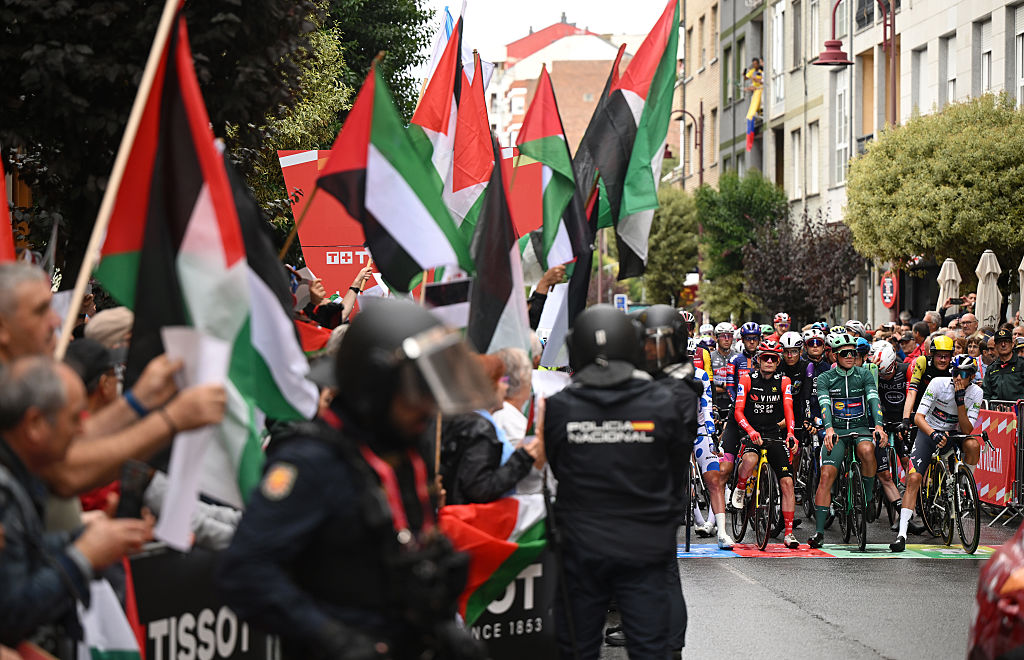
The arrival of the Vuelta in Spain also overlapped closely with Socialist PM Pedro Sánchez's announcement of fresh measures against the Israeli state as it intensified its actions in Gaza. And this in turn overlapped with a broader wave of support for demonstrations across Europe as the conflict in Gaza approaches its two-year anniversary.
Sánchez' measures included making a de facto arms embargo official, banning ships carrying fuel for Israel's military from entering Spanish ports, and upping Spain's humanitarian aid to Gaza in 2026 to €150 million. In 2024, together with Norway and Ireland, Spain was one of the first three western European countries to recognise the Palestinian state, and as CNN reported, it was the first European state, too, to go to a UN court to ask to be able to join South Africa's ongoing case accusing Israel of 'genocide' – claims Israel and other countries reject.
Historically, too, the backing for Gaza could have an indirect link with the notable level of popular support for the independence of Western Sahara, particularly in left-wing circles. While Spain officially backed Morocco's claims of sovereignty over Western Sahara in 2022 after years of neutrality, it sparked significant criticism for lack of popular consultation. But even so, the number of support groups for the population affected by the ongoing conflict, particularly when it comes to exchange programs and medical support for Saharawi refugee camps, remains high.
With such events taking place at national level, it was arguably all but impossible for the government to ignore the ongoing attempts at boycott and protest in its country's biggest bike race. The government itself has been notably neutral-to-supportive on the unfolding events in the Vuelta, with the Minister of Culture and Sport, Pilar Alegría, saying that she hopes the race will finish in Madrid, but arguing that Israel-Premier Tech should not be allowed to continue.
Yet if the timing of the Socialists' measures against Israel all but made it inevitable that they would have to make some kind of statement about the deepening pro-Palestinan protest crisis enveloping the country's biggest bike race, the politicisation of the race had already begun. Calls from the hard-left Izquierda Unida coalition for Israel-Premier Tech to be removed and by a spokesperson from anti-austerity party Podemos to block the race completely were compounded by the support of a leading radical Basque nationalist, Arnoldo Otegi, for the activists who caused the partial suspension of the Bilbao stage. Then on stage 20, Podemos leader Ione Belarra and its EuroMP and former government minister Irene Montero both were present in the blockade of the route in the town of Cercedilla.
"The same thing has happened as always in Spain," one Vuelta journalist who did not want to be named told Cyclingnews. "This whole situation has gone down the usual division of any event to left versus right.
"The hard left have made it their cause, and as soon as that happened, the right and hard right jumped on the bandwagon to make sure everybody knew they were on the other side.
"At the same time, popular support for protests are coming out of a very deep well here in Spain."
The instant politicisation of almost any event inside the Spanish frontiers stretches far beyond the Vuelta a España. In the recent spate of forest fires, for example, that ripped across Spain – and the effects of which were plainly visible on stage 17, won by Giulio Pellizzari – rather than back the Socialist government and try and form a national emergency committee, heavyweights in the right-wing Partido Popular opted to call it "tactical manoeuvring". Similarly, when it came to the Socialists' latest measures against Israel, the right wing preferred simply to label it "a smokescreen" to hide Sánchez' ongoing difficulties with corruption scandals.
What now for the Vuelta?
Meanwhile, the protests have continued, and after stages 11 and 16 in particular, where the question of the race's viability to continue reached fever-pitch levels, the final stage into Madrid may well see more challenges to its goal of ending on the Paseo de la Castellana at around 7.30pm on Sunday evening.
Far left support in Spain is traditionally strongest in urban areas like Madrid and Bilbao, whereas in rural areas, although there have been specific attempts to disrupt the race, the sparse population in the so-called España vaciada ('emptied-out Spain') and more conservative beliefs have proportionally reduced the number of blockades.
The organisers have responded by appealing for massive reinforcements from the Spanish police, with over 1,200 officers, a level last seen in the NATO summit of 2022, set to patrol the streets of the capital on stage 21. But this, in turn, has helped continue the snowball effect of added political reactions, with the right wing mayor of Madrid, José Luis Almeida, promising "zero tolerance" against violent attempts to disrupt the race, and blaming the left for "creating a culture for the protests to go too far". At the same time, Socialist spokesperson Maria Reyes Maroto said she would not attend the finale on Sunday evening "in support of Palestine".
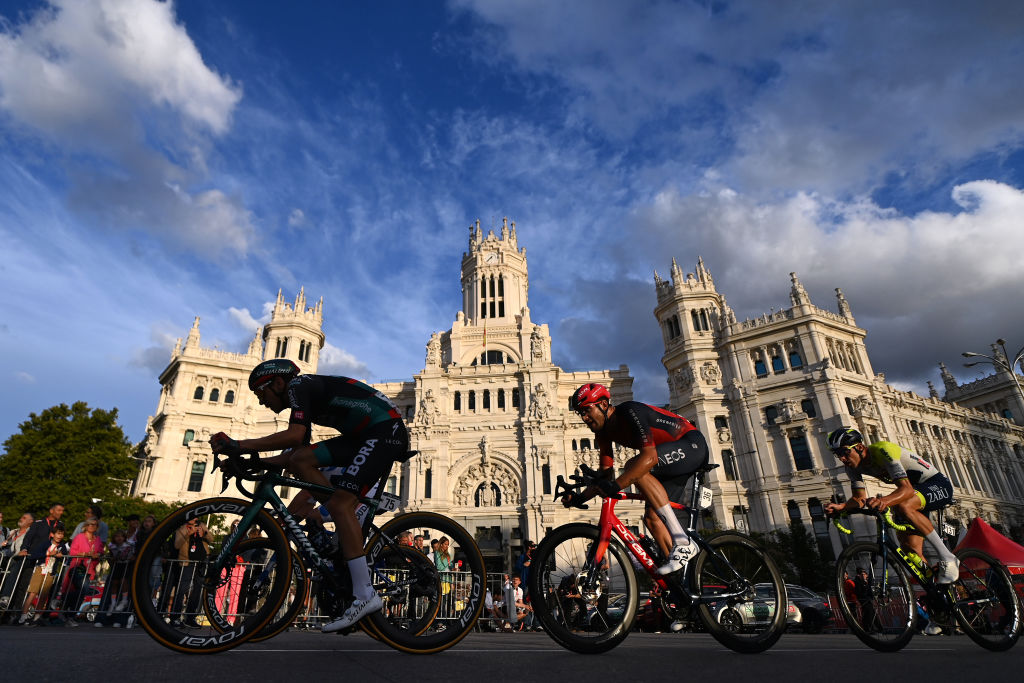
The effect of so many protests has been the same as the Giro d'Italia in the 2020 pandemic, or, stretching further back in history, the 1998 Tour de France – fear over whether the race can even go on. Interest in the race as a competition shrank and, as organisation sources told Cyclingnews, a sudden spike in the number of late requests for media accreditations reflected the Vuelta's abrupt acquired interest as a news item in itself. "Either that," as the source wryly put it, "or suddenly a lot of people have suddenly got the cycling bug."
And when the Vuelta ends, one way or another, and the race returns next year to the roads of Spain? A large poster on at the stage 19 start in Ruedo, where a large police control at the village entrance, complete with coils of concertina wire ready to be pulled out across the road coincided with zero pro-Palestine flags at the sign-on, was perhaps an indication of what could happen further down the line.
"Apoyo económico para los viticultores afectados por el mildiu" ('economic support for winegrowers affected by mould'), the sign read, even as policemen patrolled up and down the start area, looking for any sign of unrest from the non-existent pro-Palestine demonstrators, but finding demonstrators for other causes instead.
Regardless of what happens, it seems, the protests that have always been part of a bike race will remain – and likely the stray dogs in the road, sadly, won't be disappearing soon either.
Subscribe to Cyclingnews for unlimited access to our 2025 Vuelta a España coverage. Our team of journalists are on the ground from the Italian Gran Partida through to Madrid, bringing you breaking news, analysis, and more, from every stage of the Grand Tour as it happens. Find out more.







